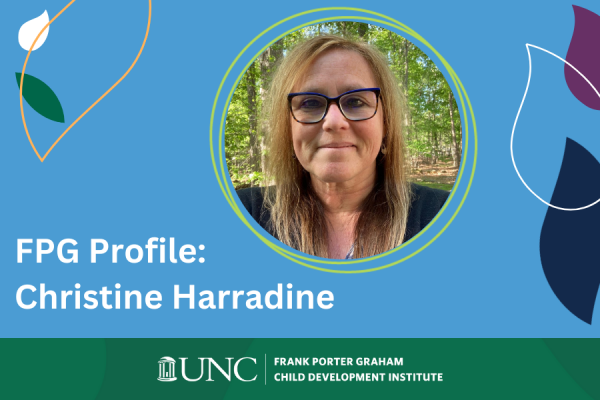
FPG Profile: Christine Harradine
Christine Harradine earned both her MA and PhD in Educational Psychology from UNC-Chapel Hill and is a long-time member of the Frank Porter Graham Child Development Institute (FPG). Her research interests include early childhood education; young children with academic potential; how children find meaning in school; and the systematic approach to recognizing, nurturing, and responding to the strengths and needs of all young children. Instructional design, e-learning product development, survey research, quantitative and qualitative research, and evaluation are all part of what she does. Sharing data in ways that are accessible and approachable to a wide audience of people is a particular passion for Harradine, as is searching for and elucidating themes in vast amounts of data.
As part of our FPG profile series, we recently spoke with Harradine to learn more about her work at FPG. Here’s what she had to say.
Tell us a bit about your professional journey―and what brought you to FPG?
I have spent my career at FPG, at first joining Dick Clifford at the downtown FPG space as a graduate assistant in 1994. I finished my doctoral work with Jim Gallagher and Mary Ruth Coleman, after which I was able to be home with our newborn son. When Ryan started kindergarten, I came back to FPG as a part-time temp and worked with several projects (U-STARS~PLUS, PAS, FirstSchool, ECTA) in that capacity until joining the Early Childhood Technical Assistance (ECTA) Center and STEMIE in 2000 as a full-time research scientist and technical assistance specialist.
What do you do at FPG—describe your job, walk us through a typical day, and tell us about the projects you're currently working on.
No two days are ever alike. I work with STEMIE doing instructional design, product development, collaborating on website design building, and literature searches. I believe wholeheartedly in STEMIE’s core tenets that children’s thinking unfolds in a predictable way and that STEM (science, technology, engineering, and mathematics) is everywhere in daily routines and activities. It is our job as adults to help support children explore their world by attending to the environment, materials, and guidance so that every child can participate fully. My work at ECTA involves instructional design, module development, editing, and leading digital accessibility efforts.
What do you like most about your job?
Collaborating with the brilliant, kind, devoted people who work here is the best part of my job. The fact that we do evidence-informed work to improve the lives of children and families gives powerful meaning to the work itself.
What do you find most challenging?
I am really trying to embrace using plain language in our products, finding ways to explain sometimes complicated concepts in clear, non-jargony ways. It is so hard to find that line between “sharing everything you know in case someone else wants to know it too” and “giving folks just enough with clear examples to understand and implement for themselves." Often, less is more, but it must still be comprehensive enough to be used.
How does your work further the mission of FPG?
The ECTA Center supports state IDEA Part C and Part B, Section 619 programs in developing high-quality, effective, and sustainable state and local systems, to implement equitable access, services, and supports for children with disabilities and their families that result in positive outcomes. I’m uncertain how to respond more effectively to FPG’s mission of advancing knowledge to transform children’s lives.
What do you hope to have accomplished five years from now?
I hope to be a change agent for my colleagues in making a mindset shift to consider the accessibility of our work as a core component and not as an afterthought.
Is there anything else you would like our readers to know about your work at FPG?
I am a UNC digital accessibility liaison, which means I have attended and integrated numerous trainings on how to ensure all digital products my projects develop meet guidelines so that all people who want to interact with our products have the supports in place so that they can. Accessibility is a continuous journey, and this experience has changed my perspective completely. Accessibility issues are the first thing I see when I browse the internet or attend meetings where PowerPoint files have not been checked and remediated!
